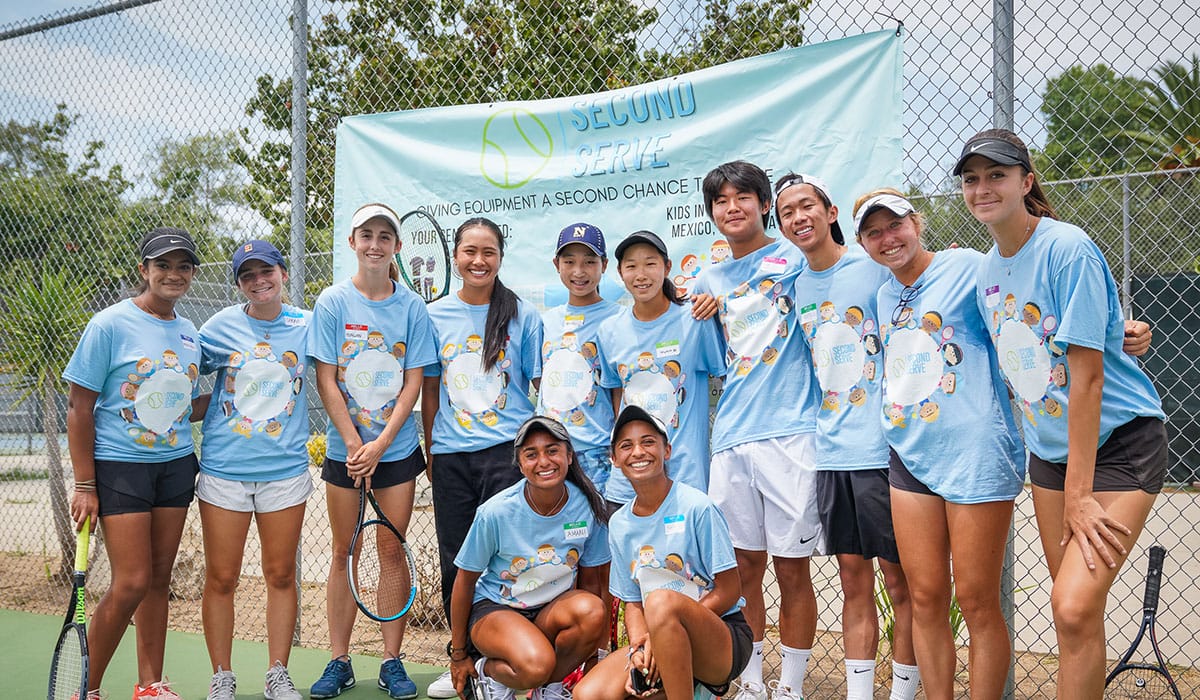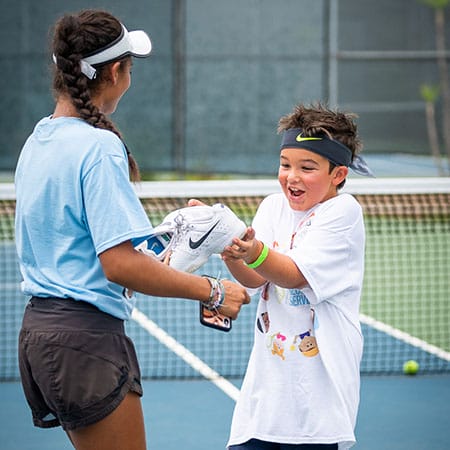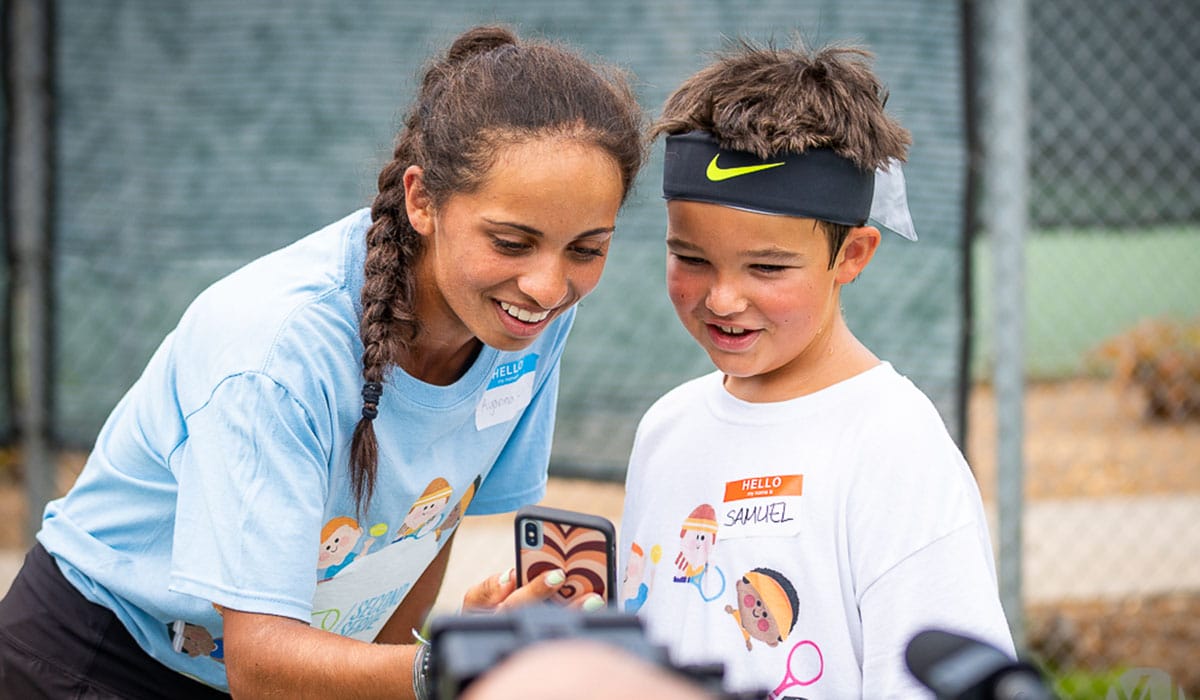Competitive Junior Player Increases Access to Tennis With Donated Equipment and Free Clinics

Meet Daily Point of Light Award honoree Ayanna Shah. Read her story, and nominate an outstanding volunteer or family as a Daily Point of Light.
Ayanna Shah, 17, is a self-described beach rat who loves bringing along Tucker, her dog. The golden retriever resulted from a deal with her dad during the pandemic that involved lots of reading and winning a USTA Level 2 tennis tournament. She and her older sister, Amani, started playing seriously when they moved to the endless sunshine of San Diego about eight years ago. In 2019, the two of them started Second Serve after realizing that the high barriers to entry of the sport they love prevented many from the same opportunities to have fun, make friends and compete. The organization addresses challenges of access and inclusion by collecting and donating new and gently used equipment and offering free clinics.
While Amani is now away at college, Ayanna has stepped back from high-level competition to spend more time running the organization but continues to play for fun. Second Serve now has grown exponentially. More than 200 youth have collected and distributed more than 27,000 pieces of equipment in 38 states and 15 countries. Last year, they outfitted more than 40 low-income high schools in the U.S. alone. And Ayanna has just returned from Washington, D.C., where she accepted a micro-grant from the Aspen Institute for Second Serve’s commitment to make tennis more accessible.

What inspires you to get started with this initiative?
We had a private tennis coach who had moved to a lower-income part of San Diego called Escondido. He was giving us lessons at Kit Carson, a park with soccer, softball, baseball and even disc golf. We would come for our lessons, and there would be kids playing everything but tennis.
Around the same time, our very first coach, Eduardo Sanchez, reached out to us. He had started a tennis program that gave free clinics to kids just across the border in Tecate, Mexico. One thing that they were lacking when they came to his program was equipment. Tennis rackets and other gear can be expensive; it’s a pretty high barrier to entry into the sport. We were wondering why kids weren’t on the tennis courts at Kit Carson, and then we heard from Eduardo and it clicked.
As competitive national players, we had a ton of equipment sitting in our garage collecting dust, so we donated it to Eduardo. We thought others were likely to have the same surplus. That’s how Second Serve started.
We created a team of young leaders and have had over 230 people join. We’ve built around 157 partnerships. Some are under-resourced Title 1 high schools, and others are organizations that serve under-resourced youth–NJTLs, organizations the USTA Foundation started to run low-cost tennis clinics; Boys and Girls Clubs; Big Brothers Big Sisters, etc.
The attitude that my sister and I started with, gratitude for what we had, has spread to our entire team. They’ve been fortunate enough to be part of this tennis community, and they’re giving other kids the opportunity to play.
Tell us about your volunteer role with Second Serve.
I oversee the processes going on internally. Recently, our team was getting so big, it was sometimes taking three or four hours out of my day to work on logistics. We worked with a Stanford computer science student to develop an internal website and platform to help streamline the processes of completing what we call a “donation cycle,” which includes collecting equipment, connecting with a partner, donating equipment and highlighting that site. That has taken a lot of the logistical strain off of me and freed up time for finding new avenues of growth.
For example, we’ve started expanding into the college space. We want to ensure that the organization creates change for decades to come, and it will keep the organization youth-led, but it will create more accountability.
We organize yearly events like our annual Community Day and fundraisers. I oversee a leadership team of 11 and communicate with our board of directors. I run our marketing, lead team meetings, and write grants. There’s a lot of stuff to do, but I really enjoy the work. When I feel like I’m doing something for myself, I’m not as motivated to do it. With Second Serve, it’s for other kids, and the more time I put in, the more those kids will get out of it. That’s how I motivate myself.
What’s been the most rewarding part of your work?
It’s seeing the smiles of these kids and hearing the stories of the people we’ve impacted. To give you an example, there’s a girl in Nigeria, about 11, who uses tennis as her outlet. For me and my sister, tennis was super competitive. We were making friends, but it was all about the tournaments and traveling. To see that it was not like that around the world, that it was a safe space and a chance for a college scholarship to improve your opportunities, really opened my eyes.

What have you learned through your experiences as a volunteer?
My leadership skills have grown with the organization. When my sister left for college, it was difficult to choose between playing at that super competitive level of tennis or trying to lead the organization. I’m glad I chose the organization, because I think it’s shown me that the world is so much bigger than me. It’s had the same impact on the rest of our team. I found myself in service, and it’s something that I’ll do for the rest of my life.
Tell us about future partnerships, programs or events that you are excited about.
Over the summer, we run an annual Community Day. In the morning, we run a free tennis clinic. Last year, we had about 80 kids come, so this year we hope to have 125 to 150. We have music playing and drills spread across six courts at Kit Carson Park, where this whole endeavor started. In the afternoon, we hold a fundraising event to help service those kids specifically.
What do you want people to learn from your story?
When you know you want to do something good, just do it. Take action. The more that you think about it and deliberate, you’re never going to get to it. And the other thing I’ve learned from my experience is that when you do things for the right reasons, things just kind of fall into place.
Do you want to make a difference in your community like Ayanna? Find local volunteer opportunities.
